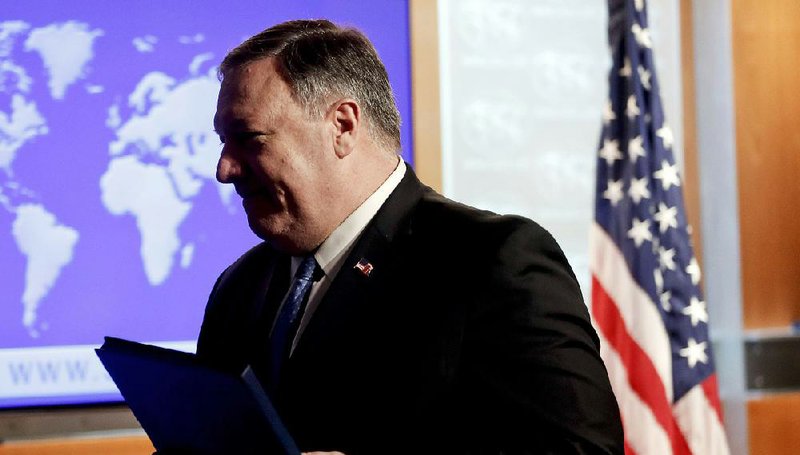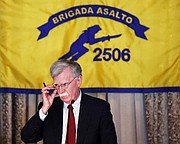CORAL GABLES, Fla. -- President Donald Trump's administration Wednesday intensified its crackdown on Cuba, Nicaragua and Venezuela, announcing new restrictions and sanctions against the three countries whose leaders national security adviser John Bolton dubbed the "three stooges of socialism."
"The troika of tyranny -- Cuba, Venezuela and Nicaragua -- is beginning to crumble," Bolton said in a speech near Miami on the 58th anniversary of the U.S.' failed Bay of Pigs invasion of Cuba, an attempt to overthrow that nation's government.
Bolton announced a new cap on the amount of money that families in the U.S. can send to their relatives in Cuba. President Barack Obama's administration had lifted limits on remittances, but the new limit will be $1,000 per person per quarter. Remittances to Cuba from the United States amounted to $3 billion in 2016, according to the State Department.
The U.S. also moved to restrict "non-family travel" after a broad loosening of so-called purposeful visits under Obama led to soaring numbers of American trips for cultural and educational exchanges. Details on the restrictions were not immediately clear, but tourism is a key lifeline of hard currency for Cuba. Bolton called such visits "veiled tourism."
Bolton spoke hours after Secretary of State Mike Pompeo announced a policy allowing lawsuits against foreign firms operating on properties Cuba seized from Americans after the 1959 revolution. The U.S. has enforced a trade embargo against Cuba since the early 1960s.
On Venezuela, Bolton said the U.S. was sanctioning the country's central bank, which the Trump administration says has been instrumental in propping up the government of President Nicolas Maduro. The sanctions do not bar humanitarian aid or private remittances and aim to ensure reliability of debit and credit card transactions, which have become essential during skyrocketing inflation and a shortage of cash notes.
Bolton also announced sanctions against financial-services provider Bancorp, which he claimed is a "slush fund" for Nicaraguan President Daniel Ortega.
"The United States looks forward to watching each corner of this sordid triangle of terror fall: in Havana, in Caracas and in Managua," Bolton said in south Florida, which is home to many thousands of exiles and immigrants from the three countries.
He said Obama administration policies had given the Cuban government "political cover to expand its malign influence" across the region, including in Venezuela. Cuba has trained Venezuelan security forces to repress civilians and support Maduro, Bolton said, calling Maduro "quite simply a Cuban puppet."
Cuban officials met the announcements with defiance.
"Nobody will snatch away from us, neither through seduction nor force, 'the Fatherland that our parents won for us by standing up,'" President Miguel Diaz-Canel said on Twitter. "We Cubans will not surrender."
Foreign Minister Bruno Rodriguez called it an attack on international law, Cuban sovereignty and countries that would do business with the island. "Aggressive escalation by US against Cuba will fail. Like at Giron, we will be victorious," he tweeted, referring to a Bay of Pigs beach where invaders landed.
In Venezuela, Maduro called the move against his country the latest example of "imperialist aggression." In a nationally broadcast TV appearance, he said any nation's central bank is "sacred" and deserves respect.
"I see imperialism as crazy, desperate," Maduro said.
CRITICS EXPRESS WORRY
In his speech to the Bay of Pigs Veterans Association, Bolton said, "Today, we proudly proclaim for all to hear: The Monroe Doctrine is alive and well." The 1823 doctrine holds that the United States will not tolerate foreign intrusions anywhere in the Western Hemisphere.
But some critics of U.S. policy toward Venezuela worry that the Trump administration's stance that all options are on the table, including a military one, to oust Maduro is an empty threat that will only serve to ignite the streets and geopolitical tensions with Russia, compounding the misery of Venezuelan citizens.
"Honoring one of U.S.' greatest military fiascos from 60 years back suggests U.S. policy to Latin America owes more now to a perverse Cold War nostalgia than practical benefits for people of the region," said Ivan Briscoe, the Latin American director for the International Crisis Group, a Brussels-based think tank.
Trump, with the support of most governments in Latin America, has recognized opposition leader Juan Guaido as Venezuela's legitimate interim president and has alleged that tens of thousands of Cuban military and intelligence agents are enabling Maduro to stay in power.
The new sanctions against Venezuela's Central Bank, Bolton said, should also be a "strong warning to all external actors, including Russia," which has provided financial support to Venezuela, sold military equipment to its government and last month deployed about 100 military personnel there.
"The United States will consider such provocative actions a threat to international peace and security in the region," he said.
"The walls are closing in," Bolton said of pressure against Maduro. "There is no turning back. The people will prevail. And when they do, we know that Cuba will be next. And soon after, we pray, the third member of the Troika, Nicaragua, will also at last be free."
Many of the 400 or so who attended Bolton's speech at the Biltmore in south Florida are of Cuban descent. Rafael UsaTorres, a member of the 2506 Brigade that worked for the CIA at the time of the invasion, said he has faith that the measures will take down Diaz-Canel's government, though he wished it had been done sooner.
"Today is a big day," the 78-year-old said. "But I feel very sad -- too many years waiting."
But others said the U.S. isn't going far enough. Manuel Menendez-Pou, 79, said the Cuban government had confiscated about $63 million in property from his family, once one of the wealthiest on the island, mainly in the sugar industry.
"The problem is not the money," said Menendez-Pou, also a former member of the brigade. "They stole our life."
In Havana, Odalis Salazar worried about the future of remittances she receives from two children living abroad, including one in the United States.
"It hurts everyone, and Trump is absolutely criminal because he knows that ... [the remittances] help us a lot," Salazar said. "We Cubans have families there, and we get by largely with that help that they send us."
"We have already gone through other periods of crisis, and we overcame them," said Tania Astiazarain, a guide at the Playa Giron museum. "This does not scare us, and we are prepared for whatever comes."
6,000 CLAIMS
Pompeo's decision on allowing lawsuits lets Americans, including Cubans who became naturalized citizens years after the fact, sue companies that operate out of hotels, tobacco factories, distilleries and other properties nationalized after Fidel Castro took power.
The U.S. will begin on May 2 to enforce the provision of a 1996 law known as the Helms-Burton Act. Like his predecessors, Trump had previously waived the provision, Title III, because enforcing it could result in a flood of litigation against foreign companies.
"Americans who have had their private and hard-earned property stolen in Cuba will finally be allowed to sue," Bolton said Wednesday. "Anyone who traffics in property stolen from Americans will not be issued a visa to the United States. They are not welcome here."
The Justice Department has certified about 6,000 claims as having merit, according to Kimberly Breier, the top U.S. diplomat for the Americas. Those claims have an estimated value of $8 billion: $2 billion in property and $6 billion in interest, she said. Another 200,000 uncertified claims could run into the tens of billions of dollars, she said.
Breier said there would be no exceptions to the policy but that foreign companies "will have nothing to worry about if they are not operating on properties taken from Americans."
Nonetheless, companies in the European Union and Canadian companies stand to lose tens of billions in compensation and interest, and the decision prompted stern responses and vows to protect businesses from lawsuits.
In a statement, EU foreign-policy chief Federica Mogherini and Canadian Foreign Minister Chrystia Freeland called the decision to remove the long-standing waivers "regrettable" and said it "can only lead to an unnecessary spiral of legal actions."
In Spain, which has large investments in hotels and other tourism-related ventures on the island, a senior government official said Madrid would ask the EU to mount a challenge at the World Trade Organization.
"The extraterritorial application of the U.S. embargo is illegal and violates international law," said Alberto Navarro, EU ambassador to Cuba. "I personally consider it immoral. For 60 years, the only thing that's resulted from the embargo is the suffering of the Cuban people."
Information for this article was contributed by Gisela Salomon, Deb Riechmann, Matthew Lee, Michael Weissenstein, Andrea Rodriguez and Aritz Parra of The Associated Press; by Karen DeYoung of The Washington Post; and by Nick Wadhams, Nikos Chrysoloras, Stephen Wicary, Margaret Talev and Jennifer Jacobs of Bloomberg News.
A Section on 04/18/2019

